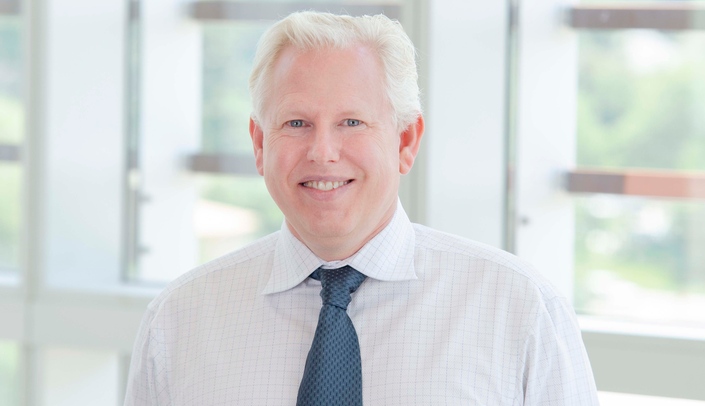The University of Nebraska Medical Center has received approval to create a fellowship program in hospice and palliative medicine.
UNMC partnered with Children’s Hospital & Medical Center and the Nebraska-Western Iowa VA Healthcare System to create the state’s first formal training program to help alleviate a shortage of physicians trained in hospice and palliative care medicine.
Physicians with hospice and palliative medicine training help patients with serious or terminal illnesses address problems with symptoms, including pain, depression and anxiety as well as help patients and their families meet social and spiritual needs. They also help determine the most appropriate treatments for patients and avoid care that may not help them meet their goals.
The one-year fellowship will begin in July 2020 with three fellows engaging in adult and pediatric rotations in areas such as pain management, oncology, and home hospice. One fellow will be focused on pediatrics at Children’s, while the adult-focused fellows will focus on rotations at Nebraska Medicine and the Nebraska-Western Iowa VA Healthcare System. New fellows will be selected each year.
The fellowship, which is subspecialty training after residency training, is open to physicians from across the state and nationwide. Physicians can have previously trained in multiple specialties and can even have practiced for years prior to deciding to pursue training.
The fellowship also will expand educational capacity for additional learning including medical students, nursing students, and resident physicians in end-of-life care.
“We need to dramatically expand the number of physicians trained in this area to meet the needs of patients in hospitals as well as in the outpatient clinics,” said Al Fisher, M.D, Ph.D., associate professor and chief of the UNMC Department of Internal Medicine's Division of Geriatrics, Gerontology and Palliative Medicine. “We know from clinical studies that palliative care — even for those with treatable diseases — can improve outcomes and quality of life.
“We can help patients manage day-to-day symptoms related to serious diseases, but as an illness progresses, there also may be times when the burden of continued medical interventions outweigh their benefits, or when aggressive treatments become inconsistent with the patient’s goals.”
Dr. Fisher points to demands for physicians with these skills at the medical center, in part, because of programs care for patients with cancer, advanced heart failure, advanced lung disease, end-stage renal disease, or serious neurologic illnesses including dementia, Lou Gehrig’s disease, or multiple sclerosis.
He said one of the things physicians with the training can do is help identify patients who could receive benefits of hospice earlier.
“Nationally we know people get referred to hospice late. The average time people spend in hospice is less than a month, and it is often just days or a few weeks. We’re really underutilizing a great resource for both patients and their families,” Dr. Fisher said.
Meaghann Shaw Weaver, M.D., associate professor at UNMC and chief of the Division of Pediatric Palliative Care at Children’s Hospital & Medical Center, said the fellowship design fosters a caring and collaborative model of education.
“The idea of rotations and shared didactics will focus not just on curricular diversity and professional formation of trainees, but also will be strategically leveraged to unify energies and caring intentions across our institutional settings,” Dr. Weaver said.
“The fellowship brings our collective time and talents together with an investment of teaching, research, and bedside mentoring to develop a community of professionally-formed, personally-enriched trainees ready to bring competent, compassionate, collaborative care. As our nation faces a stark shortage of palliative care physicians, the strengths of this fellowship model proactively ensures ongoing palliative care excellence in our region.”
Medical director of hospice and palliative medicine at the Nebraska-Western Iowa VA Healthcare System, Lou Lukas, M.D., said doctors trained in palliative medicine provide an extra layer of support to people with serious illness.
“They offer a more nuanced approach to complex decision-making and meticulous attention to symptoms, so that people feel heard, get treatment that matches their goals and values, and maximize quality of life, even in the advanced stages of illness,” said Dr. Lukas, also an associate professor of hospice and palliative medicine at UNMC. “So many people come to UNMC from across the state to get treatment for advanced illness. We need more doctors who can work with them during acute treatment and when they return to their communities.”
Applications for the fellowships are being taken from Aug. 1 through Oct. 31. Physicians and resident physicians interested in applying can go through the Electronic Residency Application Service® or contact Travis Weyant, tweyant@unmc.edu or 402-559-3964.
We are Nebraska Medicine and UNMC. Our mission is to lead the world in transforming lives to create a healthy future for all individuals and communities through premier educational programs, innovative research and extraordinary patient care.
Twitter | Facebook | Instagram | YouTube | Flickr
UNMC receives approval for fellowship in hospice, palliative medicine
- Written by Vicky Cerino
- Published Jun 10, 2019

Media Contact
Vicky Cerino
UNMC Strategic Communications
(402) 559-5190
(402) 559-4353
vcerino@unmc.edu